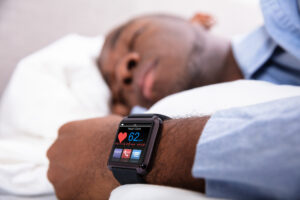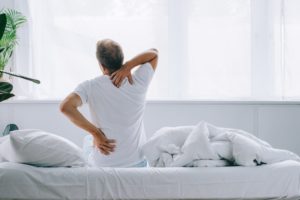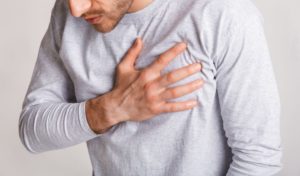When you buy through our links, we may earn a commission. Products or services may be offered by an affiliated entity. Learn more.
Heart Palpitations at Night
At a Glance
Heart palpitations at night…
- Feel like: fluttering, racing, or pounding in the chest, neck or throat or an irregular, skipped, or extra beat.
- Are caused by: stress, anxiety, caffeine, certain medications like decongestants, hormonal shifts, or underlying heart conditions, such as atrial fibrillation or ventricular tachycardia.
- Can be treated with: lifestyle changes, stress management techniques, medication adjustments, or treatment for underlying medical issues.
- Require medical attention if: they occur frequently, last more than a few minutes, cause dizziness, chest pain, or shortness of breath, or are accompanied by fainting.
Feeling your heart race or flutter at night—especially when you’re lying down—can be unsettling. While heart palpitations during sleep may seem alarming, they’re often harmless and surprisingly common. In many cases, they’re triggered by anxiety, caffeine, or certain medications, though they can occasionally signal an underlying heart issue.
Below, we’ll cover what causes heart palpitations at night, how to manage them, and when to seek medical attention.
Looking to improve your sleep? Try upgrading your mattress.
What Do Heart Palpitations Feel Like?
Usually you don’t notice your heart rhythm, but with heart palpitations, you have an uncomfortable awareness of your own heartbeat. You may feel like your heart is beating more strongly than usual, or notice changes in your heart rate or rhythm.
A person with heart palpitations might notice one or more of these sensations when lying down at night:
- Rapid heart rate (racing heartbeat)
- Irregular heart rhythm
- Missing or extra heartbeats
- Fluttering in the chest
- Flip-flopping sensations
- Pounding in the chest, neck, or throat
Monitoring your heart rate on a nightly basis can help you recognize heart palpitations and other medical issues. One of our favorite sleep trackers, the Oura Ring, also measures heart rate and heart rate variability.
What Causes Heart Palpitations at Night?
Heart palpitations are common, and they only rarely indicate an underlying health problem. Many factors can contribute to nighttime heart palpitations, ranging from heart problems to sleeping position. However, in some cases heart palpitations or a heart racing at night occur for no known reason .
Heart-Related Issues
Several heart problems can cause sleep-disrupting heart palpitations, including heart disease, damage from a heart attack, and heart rhythm disorders called arrhythmias . And palpitations caused by a heart condition may be more noticeable when a person is lying down.
- Premature beats: Premature heartbeats are the most common type of abnormal heart rate, and they’re generally harmless. They’re most common among people who don’t have another heart problem. And though they may cause the sensation of a skipped heartbeat, they don’t actually cause the heart to skip a beat.
- Atrial fibrillation: Atrial fibrillation is an abnormal heart rhythm that’s both rapid and irregular . In addition to heart palpitations, atrial fibrillation can cause chest discomfort, lightheadedness, or shortness of breath. Because atrial fibrillation increases a person’s risk of blood clots and other issues, treatment is often required.
- Ventricular tachycardia: Most people have a heart rate between 60 and 100 beats per minute, but those with ventricular tachycardia (VT) have periods of time when their heart rate is above 120, and not because of physical exertion . VT is treated when episodes last over 30 seconds or are accompanied by chest discomfort, weakness, or lightheadedness.
- Heart failure: A person may experience heart failure after a heart attack or an extended period of a very rapid heart rate. Treating heart failure is important, since the heart isn’t adequately supplying the body with needed blood. Other symptoms of heart failure are shortness of breath, coughing or wheezing, swelling in the legs or feet, tiredness, lack of appetite, confusion, and sudden weight gain .
Other Medical Conditions
- Sleep apnea: Sleep apnea causes repeated pauses or reductions in breathing during sleep. These breathing disruptions can cause oxygen levels to dip, which can stress the heart and lead to heart palpitations at night.
- Stress and anxiety: Already known to interfere with sleep and potentially lead to sleep deprivation, stress and anxiety can also bring on heart palpitations. Additionally, research suggests that people with chronic anxiety are more likely to develop arrhythmias that cause irregular heartbeats.
- Thyroid problems: An overactive thyroid gland can result in a rapid heart rate or irregular heart rhythm.
- Anemia: If a person’s body doesn’t have enough red blood cells to keep the body supplied with oxygen, their heart may beat faster than usual.
- Hypoglycemia: Low blood sugar levels can cause anxiety symptoms , including heart palpitations.
Alcohol and Caffeine
- Alcohol consumption: Heavy alcohol users have a greater risk of cardiomyopathy, a condition that enlarges the heart and increases the risk of arrhythmias. Since people usually drink alcohol after 6 p.m., and because alcohol can interfere with sleep, people may be more likely to notice alcohol-induced heart palpitations at night.
- Caffeine use: Caffeine can elevate the heart rate and may add extra beats. The effects of caffeine can last up to eight hours, so people who consume caffeine in the afternoon or evening have a greater chance of nighttime heart palpitations and an increased sleeping heart rate.
Temporary Physical States
- Dehydration: Not drinking enough water can make the heart beat fast and forcefully. Therefore, people who go to bed dehydrated may have a greater chance of heart palpitations. In addition, research shows that dehydration can shorten the time spent asleep , so it could increase the chances of noticing heart palpitations at night.
- Electrolyte imbalances: Arrhythmias, or irregular heartbeats, can result from low levels of electrolytes such as potassium and magnesium. An electrolyte imbalance may occur at night if a person doesn’t consume enough nutritious food and drink during the day.
- Sleep position: People who sleep on their back or left side are more likely to have heart palpitations. People who sleep on their left side, in particular, may have increased awareness of heart sensations, as it shortens the distance between the heart and the chest wall.
Other Causes
- Pregnancy: Pregnant people often notice heart palpitations, possibly because of the increased heart rate and blood volume during pregnancy.
- Fever: Fevers often cause a person’s heart rate to speed up.
- Medications and recreational drugs: Certain prescription and over-the-counter medications, such as blood pressure medications and decongestants, can cause heart palpitations, as can the use of recreational stimulants like cocaine.
How Are Heart Palpitations Diagnosed?
A doctor may be able to diagnose the cause of a person’s heart palpitations by conducting a thorough physical examination, reviewing their medical history, and ordering diagnostic tests.
Physical Examination
During a physical examination, a doctor will check a person’s pulse, blood pressure, blood oxygen levels, and body temperature, as well as listen to the person’s heart for any abnormal sounds.
The doctor may ask about the frequency and duration of the palpitations and if any triggers, such as caffeine or stress, make them worse. Additionally, the doctor may ask about the medications a person takes and whether heart palpitations run in their family.
Electrocardiogram
One standard medical test for people with palpitations is the electrocardiogram (ECG or EKG). An EKG is a painless, non-invasive procedure that records the electrical signals produced by heartbeats. Doctors can use this information to identify abnormal heart rhythms.
Since heart palpitations might not happen at the time of the EKG, the test may not detect any unusual heart activity. In this case, the doctor may recommend wearing a monitor to track the heart’s activity for a few days.
Other Diagnostic Tests
Based on the results of the EKG, the doctor may also order blood tests or other diagnostic tests, like imaging or a stress test. These tests can help doctors learn whether the heart palpitations might be related to anemia, electrolyte imbalance, an overactive thyroid, or other underlying health concerns.
How Are Heart Palpitations Treated?
The treatment for heart palpitations varies, depending on the cause. Most heart palpitations don’t indicate any serious underlying problem, but doctors often provide testing just to be on the safe side. Then, the test results determine which treatments are offered.
Avoid Caffeine and Stimulants
One of the first approaches to heart palpitations is to discontinue any substances that may contribute to them. Caffeine is well-known for causing or worsening heart palpitations, as are many prescription medications. A person may need to taper off of these drugs over time, under the supervision of their doctor, and begin a new replacement drug if the one causing palpitations was medically necessary.
Provide Reassurance of Harmlessness
When there’s no underlying cause of heart palpitations, or they’re found to result from harmless premature beats, doctors provide reassurance that the heart palpitations are harmless. Heart palpitations don’t usually cause pain, but they can prompt some people to worry about their health. Learning that the palpitations aren’t an indication of a greater problem may provide emotional relief in these cases.
Administer Medication to Stabilize Heart Rate
Even when heart palpitations are harmless, they may still bother some people. In these instances, doctors may prescribe a medication to stabilize the heart rate, such as a beta blocker or another medication that can influence heart rate. These medications may come with side effects, however, or cause more heart palpitations in some instances.
Treat Underlying Causes
When a person with heart palpitations is found to have an underlying cause for them, this cause is treated. Potentially harmful heart arrhythmias or heart disease may be treated with a combination of lifestyle changes and medication or, in severe cases, an invasive procedure.
Anxiety-induced palpitations may be treated with talk therapy or medication. Thyroid imbalances are generally treated with medication. Vitamin or mineral deficiencies are treated with oral supplements or infusions. Sleep apnea is often treated with continuous positive airway pressure (CPAP) therapy.
Home Management of Heart Palpitations
Nighttime heart palpitations can be managed at home when a person has seen a doctor and determined there’s no underlying cause that requires medical attention. When experiencing nighttime heart palpitations, a person may want to change sleeping positions, especially if they’ve been sleeping on their left side.
Relaxation techniques, such as deep breathing and gentle stretching, can help with anxiety. If the palpitations could be caused by dehydrating, drinking water may help.
How Do You Prevent Heart Palpitations at Night?
In addition to medical treatments, certain lifestyle changes might help prevent heart palpitations from happening at night. These include:
- Limiting caffeine, nicotine, and alcohol intake, especially at night
- Staying hydrated throughout the day
- Sleeping in a different position
- Reducing stress through healthy habits, such as by exercising, sleeping seven or more hours every night, and doing enjoyable activities
- Trying relaxing activities such as yoga, meditation, or breathing exercises
Poor sleep has been associated with an irregular heartbeat, and sleep loss can lead to anxiety, which can cause heart palpitations. For these reasons, maintaining healthy sleep hygiene practices might also be helpful. You can help establish good sleep habits by:
- Setting a consistent bedtime and wake-up time
- Keeping your bedroom quiet, dark, and cool
- Limiting exposure to screens, such as TVs and computers, close to bedtime
- Avoiding heavy meals at least two hours before bedtime
When Should You See a Doctor?
While heart palpitations are usually not serious , you may wish to consult your doctor to make sure. Your doctor can perform tests that could identify a cause of your palpitations and recommend the treatments that will work best for you.
When to Seek Immediate Medical Attention
In some situations, heart palpitations can be related to a serious health condition. Seek immediate medical attention or call 9-1-1 if you experience any of these symptoms alongside heart palpitations:
- Light-headedness or dizziness
- Chest pain
- Trouble breathing
- A resting heart rate of more than 120 or less than 45 beats per minute
- Fainting or loss of consciousness
Frequently Asked Questions
How common are heart palpitations at night?
Nighttime heart palpitations are common. Studies have found that 16% of complaints made to primary care doctors are about heart palpitations . Although the prevalence of heart palpitations in the general public isn’t clear, some doctors suggest a majority of people have heart palpitations at some point in time.
How serious are heart palpitations at night?
Most heart palpitations at night aren’t serious, but sometimes they can stem from a serious underlying condition. People who experience heart palpitations along with other certain symptoms, such as weakness, lightheadedness, or chest pain, should seek medical care.
How long do heart palpitations last?
Heart palpitations can last anywhere from a few seconds to several minutes and beyond. Some research has found that palpitations lasting more than five minutes are more likely to be associated with a heart problem or anxiety.

Still have questions? Ask our community!
Join our Sleep Care Community — a trusted hub of sleep health professionals, product specialists, and people just like you. Whether you need expert sleep advice for your insomnia or you’re searching for the perfect mattress, we’ve got you covered. Get personalized guidance from the experts who know sleep best.
References
10 Sources
-
Zimetbaum, P. J. (2021, September 23). Evaluation of palpitations in adults. In M. D. Aronson (Ed.). UpToDate.
https://www.uptodate.com/contents/evaluation-of-palpitations-in-adults -
Thompson, A. D., & Shea, M. J. (2022, August). Palpitations. Merck Manual Consumer Version.
https://www.merckmanuals.com/home/heart-and-blood-vessel-disorders/symptoms-of-heart-and-blood-vessel-disorders/palpitations -
Mitchell, L. B., & Howlett, J. G., (2024, September). Atrial Fibrillation. Merck Manual Consumer Version.
https://www.merckmanuals.com/professional/cardiovascular-disorders/specific-cardiac-arrhythmias/atrial-fibrillation -
Mitchell, L. B. (2024, September). Ventricular Tachycardia. Merck Manual Consumer Version.
https://www.merckmanuals.com/home/heart-and-blood-vessel-disorders/abnormal-heart-rhythms/ventricular-tachycardia -
American Heart Association. Warning signs of heart failure. American Heart Association. Published 2023.
https://www.heart.org/en/health-topics/heart-failure/warning-signs-of-heart-failure -
Goyal, A., Robinson, K. J., Katta, S., & Sanchack, K. E. (2022, June 17). Sleep deprivation. In StatPearls. StatPearls Publishing.
https://www.ncbi.nlm.nih.gov/books/NBK436016/ -
Aucoin, M., & Bhardwaj, S. (2016). Generalized anxiety disorder and hypoglycemia symptoms improved with diet modification. Case Reports in Psychiatry, 2016, 7165425.
https://pubmed.ncbi.nlm.nih.gov/27493821/ -
Rosinger, A. Y., Chang, A. M., Buxton, O. M., Li, J., Wu, S., & Gao, X. (2019). Short sleep duration is associated with inadequate hydration: Cross-cultural evidence from US and Chinese adults. Sleep, 42(2), 10.1093/sleep/zsy210.
https://pubmed.ncbi.nlm.nih.gov/30395316/ -
Silversides, C., Harris, L., & Yap, S. (2022, January 31). Supraventricular arrhythmias during pregnancy. In H. Calkins & N. A. M. Estes III (Eds.). UpToDate.
https://www.uptodate.com/contents/supraventricular-arrhythmias-during-pregnancy -
Chua CE, Leungsuwan S, Ng LY, Teo DBS. Approach to palpitations in primary care. Singapore Med J. 2024;65(7):405-409. doi:10.4103/singaporemedj.SMJ-2021-417
https://pubmed.ncbi.nlm.nih.gov/38973189/











